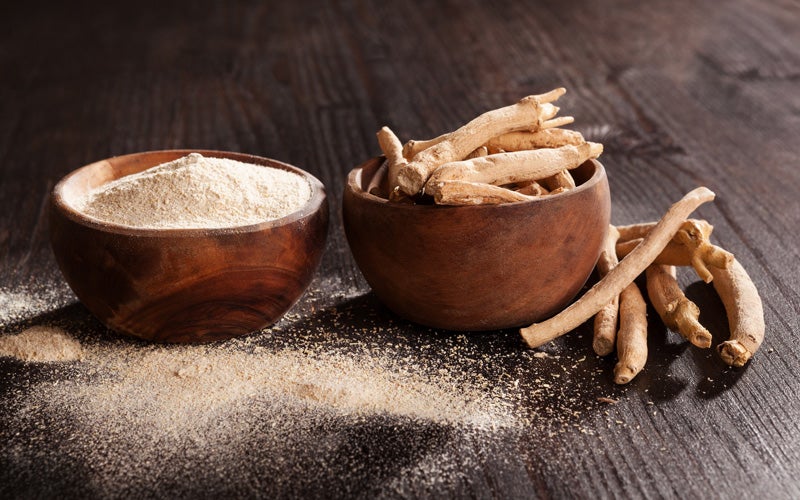What is Ashwagandha? Everything You Need to Know About This Healthy Herb
 ©eskymaks
©eskymaks
It used to be that ordering a smoothie was a fairly straight-forward event. Whey or plant-based protein powder? Check. A handful of leafy greens? Check. Frozen berries? Check. Maybe some flax or chia, some nut butter, and a banana for texture and potassium. And…voila! Breakfast, snack, or post-workout meal: done. These days, there are a lot more options. You’ve got your mushroom powders, bee propolis, tinctures, algaes, extracts, and more. Are we excited about this bevy of new options? You bet we are. Because it turns out there are ingredients and compounds that have been used all over the world for centuries that Americans are just now “finding.” These have medicinal properties that pack a punch in just a pinch. And a lot of them are naturally occurring to boot. Topping the list of terrific plant medicine extracts is ashwagandha.
What Is Ashwagandha?
This is the Sanskrit term for withania somnifera, and is also known as Indian ginseng and Indian winter cherry. Ashwagandha is a root used in Ayurveda, which is the traditional medicine practiced in India for the past 5,000 years. Ashwagandha berry shrubs grow about three to six feet high and bear bright red fruit. Don’t get distracted by the berries though, because the medicinal parts are the leaves and the root.
Interest in ashwagandha has grown along with our fascination with adaptogens over the past several years. So what’s an adaptogen? Essentially, it’s a substance that helps an organism deal with stress. In the late 1960s, adaptogens were defined as being essentially non toxic, that they helped an organism (i.e. humans) increase resistance “to a broad spectrum of adverse biological, chemical, and physical factors,” that they had a positive impact on organs across the body’s many systems, and that they could confer deep (positive) changes.
Related: Cortisol: Stop stressing about this hormone
Why do people take Ashwagandha?
One of ashwagandha’s most coveted properties is its purported way of helping the body manage stress. Stress in and of itself isn’t always a bad thing. It can actually save your life. Think about the fight-or-flight response—sensing danger, the body kicks into high gear. While we’re at it, stress is what makes a rollercoaster so fun, terrifying, or both. But chronic stress is another story. “Persistent stress response due to the environmental and social reasons may aid in developing complicated health issues such as cardiovascular disorders, hypertension, depression, panic attacks, impaired memory and cognition, digestive problems, fatigue syndrome and autoimmune disorders,” find Indian researchers. The researchers conducted a randomized, double-blind study that had 60 people take either ashwagandha or placebo capsule for two months. In the end, the people who had taken 250 or 600 mg of the real root every day had less feelings of anxiety, and their levels of cortisol — the body’s natural stress hormone—was lower, too.
Related: How to reduce stress: 9 amazing tips to bring you to a calmer place
Researchers and Ayurvedic practitioners get excited about Ashwagandha for a whole host of other reasons. For instance, some animal studies have found it has an anti-cancer effect, it may help with cognitive issues including memory deficit and loss, it could control neurodegenerative issues (Parkinson’s, Huntington’s, and Alzheimer’s diseases), may act as an anti-inflammatory and anti-arthritic, and could bolster the health of the body’s cells, according to an overview published in the African Journal of Traditional, Complementary, and Alternative Medicines. Additional large-scale research will help us get a better handle on all that Ashwagandha has going for it.
Does Ashwagandha help athletic performance?
Signs point to yes. In a study, a group of elite Indian cyclists were given either 1000 mg of ashwagandha per day for eight weeks, or a placebo. At the end of the two months, the athletes who’d received ashwagandha had improved VO2 max, improved metabolic markers, and had increased their time to exhaustion on a treadmill.
And if building muscle is more your thing, Ashwagandha could help, too. In a study published in the Journal of the International Society of Sports Nutrition, 57 men between the ages of 18 and 50 who took ashwagandha twice a day had greater improvements in their bench press and leg-extension after two months compared with people who’d undergone the same strength training routine but were given a placebo. They also saw significantly greater muscle size increase in their arms and chest, had a bump in testosterone levels, and saw a decrease in body fat percentage.
Related: How to increase testosterone
Where do things stand now?
There’s still more to learn about ashwagandha, but even if Western medicine hasn’t caught up to traditional Indian medicine, there are plenty of people who swear by it for calming, mental clarity, and reducing stress and anxiety. However, you shouldn’t take ashwagandha if you’re pregnant, breastfeeding, or have hormone-sensitive prostate cancer. And if you’re on prescription meds, you should always talk to your doctor before adding supplements — and ashwagandha in particular combined with certain drugs could cause drowsiness.
How Much Ashwagandha Should I Take?
It depends on how you’re getting it, since it comes in powders, tinctures, and capsules. Follow package directions, and don’t take more than the recommended dosage on the package. Also, if you’re taking other supplement blends, check and see if it already contains ashwagandha to ensure you’re not taking too much. Side effects of ashwagandha include diarrhea, vomiting, nausea, and headaches. If you’re concerned about whether ashwagandha is safe for you, or if you are already on medication or other treatments for conditions or disease, talk with a doctor.
As with all supplements, consistency is key. It’s not like taking a prescription drug, where you feel the effects quickly — sometimes immediately. To experience the benefits of complementary medicines, you have to take them consistently. And they have to be part of an overall healthy diet and lifestyle.
More healthy living tips from foodspring
- This outdoor workout can burn fat with no exercise equipment
- 10 Healthy Foods To Help You Get More Vitamin D
- 5 reasons why you should definitely go hiking
- 10 benefits a nature walk can have on your health
- Surprising Benefits of Rock Climbing
Sources for this article
We at foodspring use only high-quality sources, including peer-reviewed studies, to support the facts within our articles. Read our editorial policy to learn more about how we fact-check and keep our content accurate, reliable, and trustworthy.

































